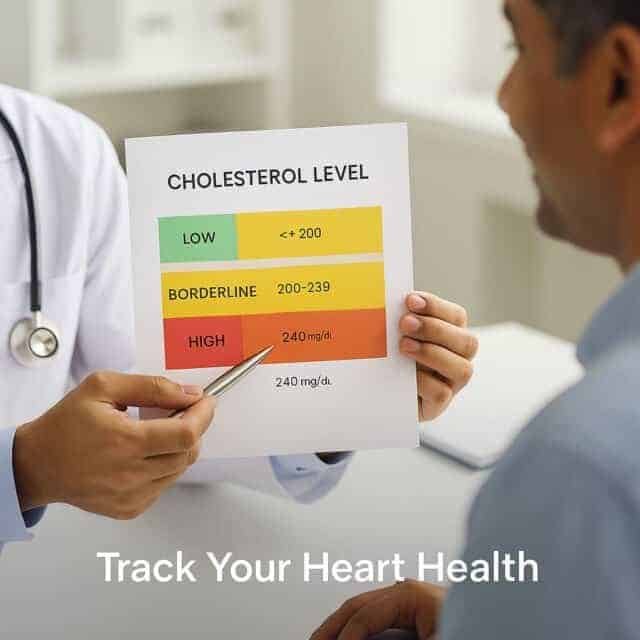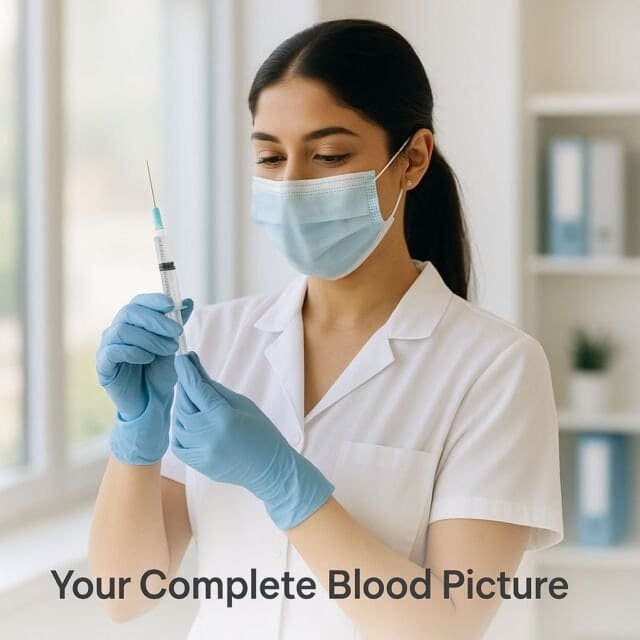Make It Your Right to Have a Healthy Life!
Compare full body checkup price across trusted Thyrocare packages and book a Thyrocare full body checkup at home. Transparent full body test price, free home sample pickup, and NABL-accredited reports.
Top Three Basic Full Body Checkup Packages
New Aarogyam Basic 1 (73 Tests)

₹799 ₹1,700
It’s a basic Thyrocare package positioned for budget-friendly screening. This package covers LFT, KFT, TSH, HbA1c, Complete Hemogram, Lipid Profile and Urine Analysis; ideal if you want a dependable full body check at a lower price point.
Aarogyam B Advanced – Wellness B Plus (95 Tests)

₹1,099 ₹3,700
Routine diagnosis with Complete Hemogram, LFT, KFT, Lipid Profile, Iron Profile, 3rd-Gen Thyroid Profile, Diabetic Profile, and Urine Analysis—excellent value.
Basic Health Checkup with Vitamins (65 Tests)

₹999 ₹2,000
Adds Vitamin D and B12 to LFT, KFT, TSH, Hemogram, HbA1c, and Iron Studies—great complete body checkup price for added nutrition insight.
Top Six Most Popular Health Checkup Packages
Advanced Wellness Checkup (95 Tests)

₹1,559 ₹6,000
Includes Vitamins D/B12, HbA1c, Calcium, Iron, LFT(GGT), KFT(eGFR), Ultrasensitive TSH, Lipid Profile, CBC Advanced, and Urine Analysis—balanced coverage for everyday screening.
Senior Citizen Wellness Advanced (94 Tests)

₹1,899 ₹8,500
Focused on 58+ preventive care: cardiac risk markers, Vitamins D/B12, metabolic, lipid, liver, thyroid, iron deficiency, diabetic profile, CBC, and kidney function.
Complete Full Body Checkup (125 Tests)

₹1,599 ₹9,500
Flagship coverage with cardiac markers, Vitamins D/B12, heavy-metal & nutrient elements, advanced CBC, iron & anemia markers, cancer markers, LFT, KFT, TFT, HbA1c, and more.
Executive Health Checkup

₹2,499 ₹7,500
Smart mix of metabolic, liver, kidney, thyroid, lipid, CBC, diabetes, and vitamins—great for busy professionals comparing full body check price vs coverage.
Fitness 360° Advanced (His/Her)

₹1,999 ₹5,000
Performance-focused panel for active adults—lipid, sugar, iron, vitamins, thyroid, liver, kidney and CBC. Popular Thyrocare packages pick.
1+1 Couple Full Body Checkup

₹2,999 ₹6,500
Two complete profiles at a bundled full body medical check up price. Ideal for preventive care together.
Top Six Master Full Body Checkup Packages
Master Full Body Checkup (140 Tests)

₹5,499 ₹22,000
Multi-specialty coverage: Hemogram, Diabetes, Cardiac Risk, Iron, Toxic Elements, Lipid, Kidney, Liver, Thyroid, Electrolytes, Pancreatic, Arthritis, hormones, and a complete vitamin profile.
Aarogyam X (138 Tests)

₹5,199
Executive panel with Arthritis, Cardiac markers, CBC, Diabetes, Electrolytes, Toxic elements, Hormones/Steroids, Iron, Lipid, Liver, Kidney, Pancreatic, Magnesium, Thyroid, Urinogram & Vitamins.
Aarogyam XL (148 Tests)

₹5,999
Most comprehensive master check: Arthritis, Cardiac, CBC, Diabetes, Iron, Lipid, Liver, Urine, Kidney, Thyroid, Vitamins, Pancreatic, Electrolytes, Hormones, Toxic Elements, Metabolic, Steroids.
Comprehensive Full Body Checkup (134 Tests)

₹2,999 ₹16,000
Depth across organ systems with advanced markers; strong option when you want a master-level complete body check at a value full body test price.
Nutrition Plus Comprehensive (131 Tests)

₹3,299 ₹16,000
An exclusive package with screening for all vitamins, minerals, micronutrients, cardiac risk, cancer, organ health, general wellbeing, expanded endocrine markers, and heavy metals for a thorough preventive checkup.
Aarogyam 1.5 Package (113 Tests)

₹3,399 ₹4,700
Premium master suite with the widest coverage in the series—excellent for users comparing complete body checkup price at the top tier.
Top Three Women’s Health Checkup Profiles
PCOS/PCOD Profile (52 Tests)

₹2,099 ₹4,000
LH, FSH, TSH, PRL, DHEAS, diabetic markers, and CBC, a screening-oriented panel covering key hormone and metabolic markers; results should be interpreted by a qualified clinician.
Reproductive & Wellness Hormone Profile (7 Tests)

₹2,099 ₹4,500
PRL, AMH, FSH, TSH, T3, T4—helps evaluate ovarian reserve and thyroid balance when planning pregnancy.
Women’s Fitness & Wellness 360 Advanced (121 Tests)

₹2,899 ₹10,000
Lipid, liver, thyroid, blood sugar, iron, kidney, PRL/LH/FSH, minerals, and vitamins—broad screening for women.
Top Six Special Health Checkup Packages
Diabetic Profile – Basic (55 Tests)

₹1,699 ₹4,000
HbA1c, fructosamine, blood ketones, urinary micro-albumin & related markers—practical choice if you monitor diabetes and want a sensible full body checkup cost.
Advanced Heart Health Screening (58 Tests)

₹1,499 ₹2,800
Comprehensive cardiac biomarkers and risk factors—useful when comparing full body checkup price with depth of cardiac coverage.
Arthritis Profile – Basic (71 Tests)

₹2,199 ₹4,000
Screens inflammatory and autoimmune joint conditions with wellness markers—value-focused full body check price is often considered when evaluating persistent joint symptoms, as advised by a clinician.
Pre-Marital Health Checkup

₹2,499
Holistic profile covering infectious diseases, key endocrine markers, blood group, and wellness markers—ideal for couples planning ahead.
Nutra Fitness 360 Advanced

₹1,899
Macro- and micronutrient insights (iron & vitamins), lipid, thyroid, liver, kidney & CBC—useful for diet and performance optimization.
Allergy Profiles (Multi-Panel)

From ₹1,999
From aero-allergens to foods—stepwise options including specific IgE panels and total IgE for guided care.
Top Eight Test Profiles in High Demand
Complete Food Intolerance – IgG (218 Tests)

₹6,999 ₹14,000
Highlights foods to strictly/moderately avoid across 10 categories—a useful add-on to a Thyrocare Aarogyam plan if you suspect food triggers.
Complete Food Allergy – IgE (93 Tests)

₹7,499 ₹15,000
Classifies heavily allergic, moderately allergic and non-allergic foods; includes total serum IgE.
Heavy Metals & Toxic Elements (22 Tests)

₹1,899 ₹3,800
Quantifies 14 toxic metals and 8 nutrient elements — a powerful context alongside a Thyrocare full body checkup.
Thyroid Profile (T3, T4, TSH)

₹399
Baseline thyroid assessment—frequently paired with wellness or master panels.
Vitamin D & B12 Combo

₹1,099
Essential vitamins commonly evaluated for nutrition status as part of an overall health assessment – a popular add-on to any Thyrocare test package.
Iron Deficiency Profile

₹699
Serum iron, ferritin and TIBC—context for fatigue and hair loss; fits well with a complete body check.
Lipid Profile (Cholesterol Panel)

₹499
HDL, LDL, triglycerides, and ratios, commonly used in cardiovascular risk evaluation as part of overall clinical assessment.
CBC Advanced (Complete Hemogram)

₹299
Comprehensive blood picture to evaluate blood parameters; interpretation depends on symptoms and clinical context.
Top Three Mostly Booked Lab Tests
HbA1c Test

₹375 ₹500
Used to monitor long-term blood sugar control. The HbA1c test is one of the most frequently booked single lab tests with Thyrocare packages.
H. Pylori IgG Test

₹1,099 ₹2,200
Detects antibodies against Helicobacter pylori, a key cause of gastritis and ulcers. Widely booked across India as a stand-alone lab test.
PRL (Prolactin) Test

₹590 ₹800
Measures prolactin hormone levels—important for fertility, reproductive health, and is commonly used in clinical evaluation alongside symptoms and medical history.
What Customers Say
How to Book a Thyrocare Test Package or Whole Body Check?
- Choose the required package, profile, or test.
- Fill out the booking form with name, age, gender, mobile, email, address, PIN code, preferred date & time.
- Get a confirmation call/message from Healthcare Offers (booking support) or the diagnostic partner assigned for your order.
- Technician visits home/office to collect sample as per your convenience.
- Pay online via link or scan QR code during collection.
- Receive reports via email/WhatsApp typically within 12–36 hours after collection (timelines can vary by location and test); an optional printed copy can be available via courier.










